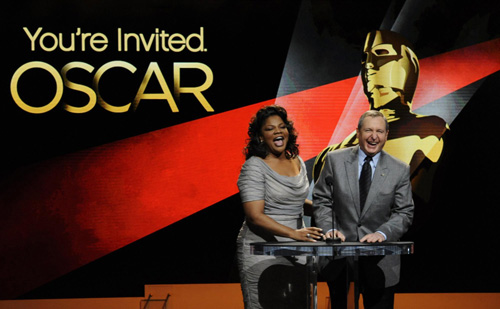Oscar race a multimillion-dollar gamble for studios

For Sony, which recently released "The Social Network" on DVD and will no doubt benefit from a huge boost in sales following Tuesday's nominations, the answer is millions.
For Fox Searchlight, which cleverly waited until January 20 before releasing "Black Swan" internationally, it's $100 million or more at the foreign box office -- maybe even $150 million if the movie wins Natalie Portman a statuette during the February 27 Oscar ceremony.
For Portman, a best actress victory could propel her into the Reese Witherspoon stratosphere of $10 million-plus a picture, a lot more than the high-six figures she made on the $13 million-budgeted "Swan" -- just as Halle Berry's asking price shot up to more than $10 million after her win for "Monster's Ball."
Nominees and winners are the obvious beneficiaries. But there's also a whole food chain gobbling Oscar money -- up this year from the recent past, thanks to having 10 slots for best picture instead of five as well as a genuinely competitive race. One report suggests trade ad pages alone have increased 20 percent.
The Oscar race has created a financial ecosystem whose tentacles reach far beyond the contenders and even beyond the Academy -- which will reap $65 million-plus from ABC for this year's telecast. The network is reportedly asking $1.7 million for a 30-second ad spot, up from the $1.3 million-$1.5 million it charged last year.
This ecosystem, on the smallest level, includes owners of screening rooms like Los Angeles' Harmony Gold, which regularly charge $1,000 to $3,500 a showing (renting big spaces like the Academy or the Writers Guild's theater can cost a whopping $6,000 a shot); newspapers like The New York Times, which gets almost $100,000 for a full-page color ad (though only $9,000 for black-and-white pages in its Southern California "walnut" edition); and, oh yes, awards consultants, those guys deemed indispensable for any genuine contenders.
Awards specialists such as PR powerhouse 42West can make $10,000 to $15,000 a month for each movie campaign; this year, they're handling everything from "Social Network" to "The Ghost Writer" to the Italian-language "I Am Love." Even smaller PR companies handling art house and foreign-language films can do OK, especially if they're successful and earn bonuses for a nomination or win, ranging from $5,000 to $20,000 -- "though the fees are lower than they used to be," laments publicist Fredell Pogodin of Fredell Pogodin & Associates.
Awards campaigners who handle a studio's entire slate might earn a $100,000 bonus if their films get multiple nominations. "At the top end of the PR spectrum, they can make anywhere from $5,000 to $350,000 in bonuses, depending on how many wins and nominations there are," says awards veteran Tony Angellotti, who handles Universal live action and Disney animation. "But this is a drop in the bucket compared to other arenas."
Those other arenas include work by advertising agencies that design for print and TV. Their fees reach into the hundreds of thousands. For a movie like "Social Network," relaunched to give it an Oscar boost, cutting a new TV spot can cost $10,000 to $40,000, according to one insider.
At least making the ads doesn't entail spending on the stars -- except for photo shoots that involve hair, makeup and stylists, notes Tom Ortenberg, president of One Way Out Media, a broad-based entertainment consulting company. "They can go from $1,000 to $10,000 a day."
Paying actors to travel is a whole other matter. Last year, sources say, one studio spent $240,000 and another $260,000 to fly two big names and their entourages to England's BAFTA awards, where they didn't even win. Both stars complained.
At least when they stay in L.A. the price is more manageable when it means just getting them to a party. However, if you're actually throwing the party, "They're anywhere from $10,000 to $50,000," says Ortenberg, and big Oscar bashes can run $500,000 or more. Parties this year range from Searchlight's modest affair at the Thompson Hotel in Beverly Hills to the lavish post-Golden Globes event co-hosted by Relativity Media, the Weinstein Co. and Marie-Claire magazine -- which made back much of its cost through sponsorships.
Maybe that's why when Ortenberg was at Lionsgate, he chose to invest instead in sending DVDs of "Crash" to the Screen Actors Guild's 120,000 members -- a move widely seen as tipping the race. The cost? $250,000.
And that's chicken feed compared with what the big studios are spending overall when this is added up.
"You're talking about anywhere from $2 million to $5 million in a campaign, which is not unusual," Angellotti says. "For a real contender in the past couple of years, it sometimes exceeds $10 million to $15 million."
Paramount's "The Curious Case of Benjamin Button" is generally believed to hold the record in terms of awards spending, an estimated $15 million, though not even studio insiders can quantify a precise number because it's often hard to separate awards costs from regular advertising. This year, "Social Network" will likely outspend "Button," which won just three low-profile Oscars from 13 nominations, temporarily souring Paramount on the Oscar process.
Does the outlay pay off in the long run? For individual winners such as F. Murray Abraham (Amadeus), Cuba Gooding Jr. (Jerry Maguire), Forest Whitaker (The Last King of Scotland) and Adrien Brody (The Pianist), the Oscar has failed to turn them into superstars. In fact, in the eight years since he snagged his Oscar, Brody has gone from "King Kong" to "Predators" to suing an Italian company for $640,000 owed on an unreleased thriller, "Giallo."
A lot of money is spent; whether it's a sound investment is debatable. "'Milk' is still in the red," says one source familiar with the gay-rights biopic film that won for Sean Penn and writer Dustin Lance Black. "You'd be surprised how many Oscar wins just don't help."
 0
0 






